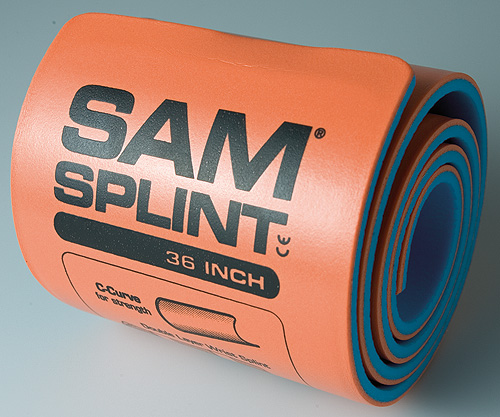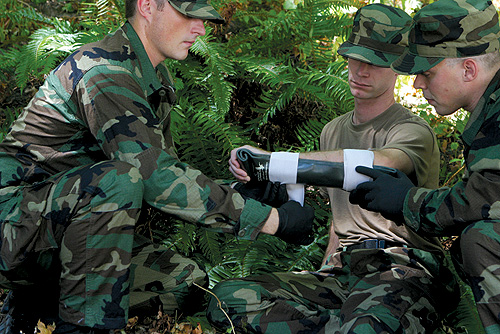 SAM Medical Products in Wilsonville created a better way to treat battle injuries after its co-founder, Sam Scheinberg, served in Vietnam as a medic and saw how poorly splints worked on burned skin.
SAM Medical Products in Wilsonville created a better way to treat battle injuries after its co-founder, Sam Scheinberg, served in Vietnam as a medic and saw how poorly splints worked on burned skin.
 |
SAM Medical Products in Wilsonville created a better way to treat battle injuries after its co-founder, Sam Scheinberg, served in Vietnam as a medic and saw how poorly splints worked on burned skin. // PHOTOS COURTESY OF SAM MEDICAL PRODUCTS |
Sam Scheinberg was a medic in the Vietnam War when he learned an unforgettable lesson about the shortcomings of battlefield splints. A soldier with two broken bones and burn wounds on his arm was suffering from pressure to his wounds after the inflatable device expanded from elevation gain as he was lifted to safety via helicopter. Scheinberg moved to relieve the pain by removing the splint, only to find that the poorly designed device had become glued to the burned skin on the soldier’s arm. When the splint came off, so did the patient’s skin.
It took a while, but Scheinberg and his wife, Cherrie, co-founders and CEO and president respectively of SAM Medical Products, have managed to replace the splints of old with their splints, which they build in Oregon and ship around the world to soldiers, emergency medical teams, paramedics and wilderness adventurers. Their 30-employee company has seen healthy growth in recent years, culminating in a major move in September into a new facility in Wilsonville, where they have consolidated their manufacturing plant, R&D labs and corporate offices into 18,000 square feet of new space, with room and plans to grow further.
After his tour of duty in Vietnam ended in 1969, Scheinberg entered a residency program at the University of Louisville. He says he was relaxing in front of an episode of The Beverly Hillbillies after a hard day of surgery in 1971 and toying with a foil gum wrapper when he came up with the initial idea for a sling made from super-strong but highly malleable aluminum, secured with medical tape. His colleagues in orthopedics helped him to fine-tune the prototype. It took a while, but by the time he and Cherrie had settled in Lincoln County (lured by a visit to the Coast on a cloudless day in August), they had a product. They launched the company in 1984, selling to emergency rooms and paramedics before landing their first military contract for the Gulf War.
They built the company through Sam’s inventiveness and Cherrie’s persistence. “I chased him around the house,” Cherrie recalls. “I would not let up.”
“She’s not kidding,” Sam adds with a grin.
Twenty-five years later, SAM splints are the top sellers in the market, with buyers in more than 100 countries. SAM also makes bandages (competing with fellow Oregon producer HemCon), pelvic slings and bandages that prevent and treat blisters and pressure sores.
“Our model is to try to solve common, serious problems with simple, elegant solutions,” he says.
The idea for the blister bandage came to Scheinberg while he was taking a walk in uncomfortable shoes in between sessions at a conference in Bismarck, N.D. He got a blister on his heel and decided on the spot to make a bursa out of some cellophane he found on the ground, replicating the sheer friction-free nature of blistered skin. To his surprise, it worked perfectly.
“That’s incredible,” he remembers saying.
His wife quickly corrected him: “No, that’s a new product.”
Beyond the obvious uses for runners and hikers, the Scheinbergs say their BursaTech products have great potential to help amputees, wheelchair users, patients confined to bed rest and people with foot problems from diabetes. Their team has submitted a $3 million grant proposal with the Department of Defense to accelerate the development of new devices to help returning vets suffering from bedsores, amputation-related discomfort and pressure sores.
Their BursaTech products are currently made in Minnesota, but the Scheinbergs plan to incorporate that work into their new Oregon facilities if they gain funding. Sam Scheinberg says the bursa line could double the size of the company if it takes off.
That could delay retirement even further. Sam is 68 and Cherrie is 66, but they say they have no interest in stopping work any time soon. “We still want to feel like we’re doing something that’s adding to the world,” says Sam. “We still want to be in the arena.”

